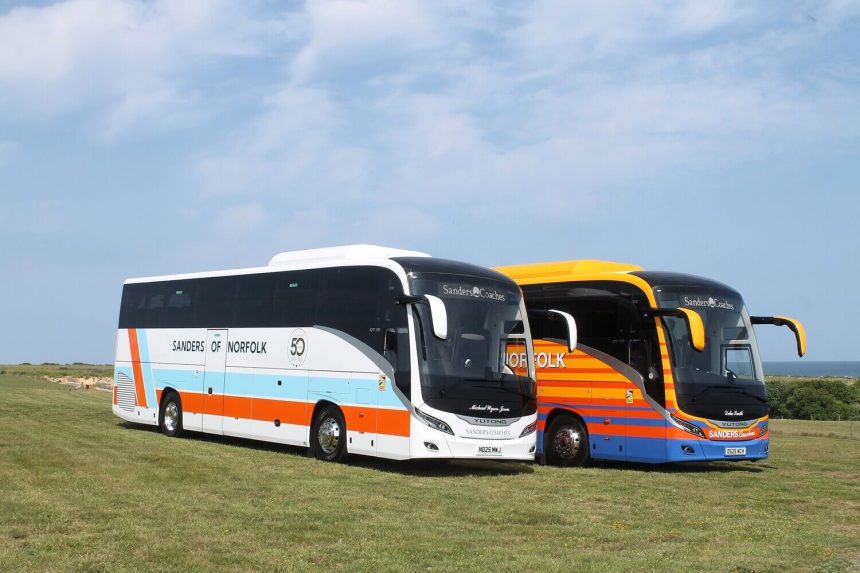Not atypically, Sanders Coaches had humble beginnings on its way to becoming one of the largest operators in the east of England.
Norman Sanders had only been working for Bennett’s Coaches of Holt for a few months when the owner, George Bennett, announced he was retiring.
Asked if he wanted to take over the business, Norman replied that he did not have any money. “That’s okay, you can pay me as you go,” George replied — in the words of Charles Sanders, one of the current directors 50 years later.
Thus, Norman inherited five coaches and one hearse, and the family has since expanded the fleet to 57 service buses and 42 coaches.
The latest two acquisitions celebrate the half-century anniversary of the business’s serving the community in Norfolk, one of the most rural counties of England.
I often sit here and wonder how it happened because it’s huge compared to where we were – Charles Sanders, Sanders Coaches Director
The new Yutong GT12 coaches are respectively kitted out in Sanders’ traditional and current liveries. The striking modern-day orange example is adorned with the name Delia Smith and the white, blue and orange heritage version with that of her husband Michael Wynn-Jones in honour of the former majority shareholders of local club Norwich City FC.
The famous cook and television presenter, who relinquished ownership of the club last year, gave permission to Sanders, which will use the vehicles to continue serving the supporters’ away trips.
Bus success for Sanders Coaches
The special anniversary vehicles are sited — like most of Sanders’ coaches — at the main Hempstead Road depot in the town of Holt where it began operations.
Although the hearse is long gone, the operator has remained as a family business at its base a few miles from the North Norfolk coast. With buses operating from a yard around the corner, it also has bases in North Walsham and Norwich.
Norman and wife Gladys developed the holiday programme, spending 15 to 20 weeks per year away. This meant that sons Charles and Paul, who started with the business as teenagers, were left with the day-to-day running, which continues to be the case today.
Charles, who had trained as a policeman but opted to work instead for the business, explains of his parents specialising in the holiday programme: “We’d take people who were on oxygen cylinders and stuff like that because they knew they’d get really looked after.”

Norman was still driving for Sanders in 2010 at the age of 80 — before his death in 2016.
In the meantime, bus deregulation meant a change of focus for Sanders. While it handed over its holiday customer database to nearby Eastons, it took on the latter’s scheduled services in exchange.
Now the business’s revenue is roughly 65% bus, thanks to commercial services and — in partnership with Norfolk County Council — tendered services.
Bus in the county has overcome the rurality of the area to bring the number of fare-paying passenger journeys to 107% of pre-COVID levels by March, according to the council’s own figures.
Go back to our old fare charts and add in eight years’ inflation, where are the fares going to be? The jump could be ridiculous – Charles Sanders on the fare cap scheme
The council, which also cites a 26% increase in patronage from 2022/23 to 2024/25, has credited the local Bus Service Improvement Plan for the encouraging returns.
Charles says: “Our partnership with Norfolk County Council has been tremendous over the years to get the network where we are today. I often sit here and wonder how it happened because it’s huge compared to where we were.”
The partnership’s successes have included the establishment of a county-wide multi-operator bus ticket.
Charles believes the government-backed fare cap scheme in England has worked well but is concerned for whenever it might end.
Speaking just after the Chancellor announced it would last at least into a fifth year, 2027, he says: “Our last fares increase was in 2019. By the time we get to 2027, that will be eight years. Go back to our old fare charts and add in eight years’ inflation, where are the fares going to be? The jump could be ridiculous.”
He adds that the level of subsidy from the government over the scheme in future will need to be sufficient to match rising operator costs.
Sanders has capitalised on the tourism market, with its Coastliner services serving walkers on the popular North Norfolk Coast Path. Charles says of the strategy: “We produce a nice timetable with plenty of information which we distribute to every holiday camp along the coast. A lot [of operators] don’t do printing. I think that’s a mistake. It costs us a lot of money, but I’m sure we reap the benefit of it.”
Charles is open-minded to exploring electrification but admits it will be a challenge at the current bus depot due to space requirements and doubts over grid availability in the area.
However, in another nostalgic look back, he adds: “We can’t get any trace of any emissions on smoke-metre readings on our ultra-low carbon diesels. They’re as clean as a whistle.
“Twenty or thirty years ago, on a freezing cold morning, there’d be a smog over the top of our garage when we started all the buses up and you could smell the fumes in the air.”
Coaching boom
Sanders Coaches is benefiting in a booming coaching market, with Charles noting that the businesses which survived the pandemic have blossomed.
He also says the availability of new vehicles is returning to the norm. “Now we’re starting to get to the point where you can perhaps get something within six months,” he says. “A year ago, they were quoting two years to supply.”
A new generation for Sanders Coaches
Another recent trend has been bigger groups buying out family or smaller coach operators. That could have happened to Sanders themselves, Charles notes.
With Charles and Paul now in their sixties, they invited Charles’ son, Martin, to come on board as Business Manager a couple of years ago. Along with Engineering Director Daniel, Paul’s son, the duo are leading the family business into a new generation.
Martin, who had been working as an accountant, admits the career choice was a difficult one to make. Charles says they may have had to have sold up if they had not agreed to come on board.

Martin adds: “I’ve got four children and Paul’s got two. And we thought, who is going to be the best person if we hand this on to run it? I’ve seen businesses where sons have just inherited from the father and they’ve gone down the pan in five years because they’re not the right person.”
He adds that Martin and Daniel entering the business enabled it to open the depot in Norwich last year. “At my time of life, I wouldn’t have taken on a new depot in Norwich,” he says.
“We saw a big opportunity up there. We do a lot of coaching work out of Norwich, anyway, so it seemed a logical thing to do to take the company forward.”
Put the passenger first, second and third – Charles Sanders
As well as creating business opportunities, the Norwich depot has helped with staffing.
Recruitment of drivers has been an issue as for most operators, but being a family business has eased things, says Charles, who adds: “A lot of people like the fact that we’re a family, we’ve got an open-door policy. We do get quite a bit of loyalty.”
Martin adds: “Somebody said yesterday that, although they’re not a member of the Sanders family, they feel like they are and they feel a responsibility to work hard for the business and make it work for us and them.”
The fact that only about four of its office staff do not have a PSV licence has also helped the business weather the recruitment storm.
Philosophy and future plans
Asked about the philosophy which has enabled the operator to prosper for 50 years, Charles quickly responds: “Put the passenger first, second and third — that’s it. Focus everything on passengers.
“As I say to all the drivers when they come and start here, don’t come to me to pay your wages. Your wages are standing out there. If you don’t pick up those people and do a good job then there won’t be any wages for anybody.”
When it comes to customer service, he adds: “If people miss the bus for whatever reason, we’ll mostly go and pick them up and take them where they want to go because then they’ll keep using you and they’ll tell everybody.”

With the first 50 years under its belt, Sanders is looking positively towards the future.
“We’ll just carry on doing what we do and hopefully what we’ve done in the past will stand us in good stead going forward,” says Charles.
“We’ve not aggressively ever gone out targeting customers, they’ve all come to us. We might do a little bit more aggressive marketing after opening Norwich because we need to get established and get some new clients. But having Norwich puts up most of Norfolk to us… It gives us a huge opportunity to expand.”


























